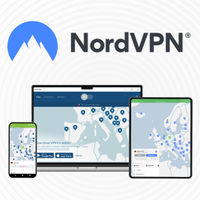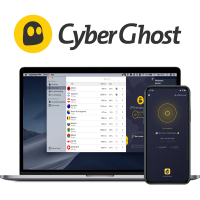Best VPN for gaming
Broaden your digital horizons (and give lag the boot) with a gaming VPN
If you're privacy-conscious, or just happen to pay a whole lot of attention to YouTuber ads, you'll be well aware of the value of using a Virtual Private Network (VPN). No matter what you get up to online (and hey, I'm not judging), VPNs provide heaps of benefits; from keeping your personal data out of the clutches of cyber-snoopers to unblocking streaming content that might otherwise be unavailable in your home country.
That said, if you're a gamer, VPNs become even more useful. Stream snipers, hackers, and online gremlins aren't afraid to slam other players with DDoS attacks—but a gaming VPN puts a stop to these antics, and can also help you bag region-specific games and massive deals in international sales.
There are a lot of VPNs on the market, however, and they're not all worth your hard-earned cash. I've put the best VPNs under the microscope, comparing their features, speed, server count, and apps, to curate this list of the best gaming VPNs in 2025.
5 best VPNS: quick overview
1. NordVPN - from $3.39 per month
The best VPN for most people
NordVPN is our favorite VPN overall - and the total package for gamers. It's more than quick enough to keep up with online matches, and won't let you down when it comes to HD streaming, either. Plus, with a built-in ad, tracker, and malware blocker, you won't have to worry about pop-ups and other digital nasties. Check out NordVPN in your own time with a risk-free 30-day money-back guarantee.
2. ExpressVPN - from $6.67 per month
The best VPN for beginners
ExpressVPN is another stellar option, primarily because it's so easy to use. Once you've picked your plan, ExpressVPN is ready to rock right out of the box, meaning you can spend more time duking it out in your favorite games and less time handling complicated configurations. While ExpressVPN is more expensive than NordVPN, its quality apps, reliable speeds, and privacy-boosting tool more than justify the price tag. See for yourself with a 30-day money-back guarantee.
3. Surfshark - from $2.19 per month
The best cheap (and fastest) VPN
Surfshark is a bargain hunter's dream, proving that you don't need to pay an arm and a leg for a gaming VPN. It's the quickest service we've ever tested, too, so you won't need to worry about impacting your online performance or cranking up the ping. We also appreciate that Surfshark gives its users unlimited simultaneous connections to play with - which is serious value for money. Take Surfshark for a test drive with a 30-day money-back guarantee.
4. CyberGhost - from $2.03 a month
The best VPN for blocking ads
CyberGhost is an industry veteran that's still going strong – and impressively speedy, too. That means you won't have any problems with lag when you're playing online, or sluggish videos when you're tuning in to your favorite shows and movies. CyberGhost has pretty nifty extras, too, including an ad-blocker that'll get rid of invasive pop-ups as you go about your day-to-day browsing. I also like that CyberGhost gives users an especially generous 45-day money-back guarantee to make good use of – so be sure to make the most of it.
5. PIA - from $2.03 per month
The best VPN for Linux
PIA is another well-respected name in the VPN sphere, and a battle-tested and security-oriented provider. It packs all the security tools you need to keep your gaming and browsing sessions free from third-party interference - and PIA has proven that it doesn't keep hold of user logs in court twice. If you like to customize your VPN apps, you'll be glad to learn that PIA's interface can be tweaked to your liking. Check out this budget-friendly service with a 30-day money-back guarantee.
The best gaming VPNs in 2025
PC Gamer's got your back
The best VPN for gaming
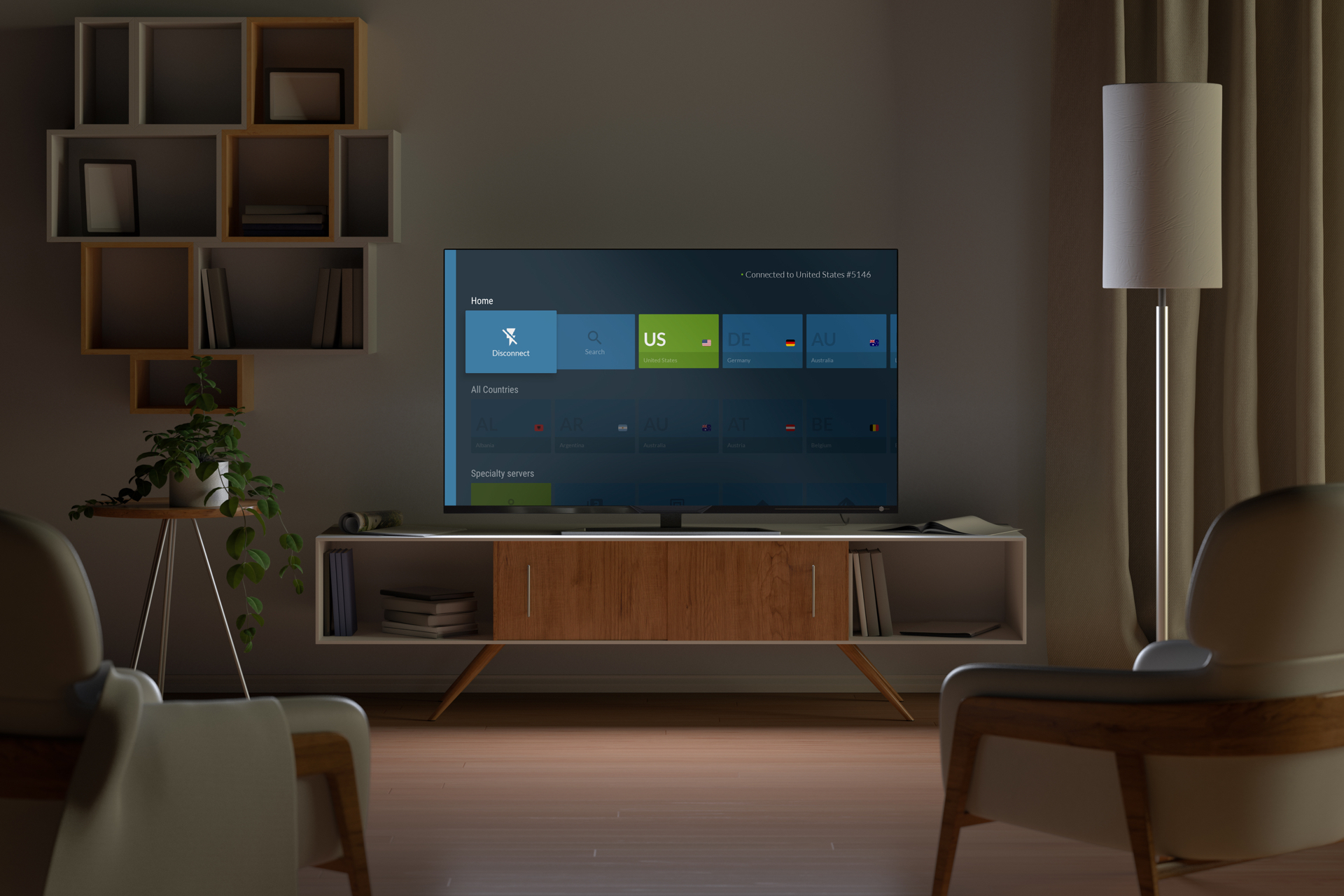
1. NordVPN
Super-fast speeds and built-in security
Speed: >950 Mbps | Servers: 5,400+ | Locations: 80 | Platforms: Windows, Mac, Linux, iOS, Android | Router support: Yes | Simultaneous connections: 6 | 24/7 customer support: Yes | Streaming services unblocked: Netflix, Amazon Prime Video, Disney Plus, BBC iPlayer, YouTube, Hulu
NordVPN is my favorite VPN overall, bar none. This is, primarily, because it's an absolute speed demon. The NordLynx protocol achieved speeds of over 950 Mbps during my most recent round of speed testing—which maxed out my connection line. That means you'll have no problem hopping into MMOs or online tournaments, and any DLC you happen to download will be done in a flash.
I'm constantly blown away by how many servers NordVPN has. You can take your pick of more than 5,400 dotted across more than 80 locations, and even save your most-used connections to a handy favorites system. So, if you make a habit of shopping around for the best gaming deals, or just want to connect to a server as close to a gaming server as possible, NordVPN makes it as easy as pie.
Nobody wants their ranked match or team game spoiled by a rogue DDoS attack. Luckily, NordVPN eliminates this threat—and all you need to do is connect to a server and go about your business. Because NordVPN assigns you a shiny new IP address, any bad actor (or sore loser) that tries to target yours with a DDoS attack will have an incredibly difficult time doing so. Plus, NordVPN is an audited no-logs service you can count on to safeguard your privacy without taking a peek at your details for itself.
While NordVPN is a stellar choice all around, it is let down somewhat by its finicky UI which, although stylish, can be particularly cumbersome to use on the mobile versions of the app.
The best user experience
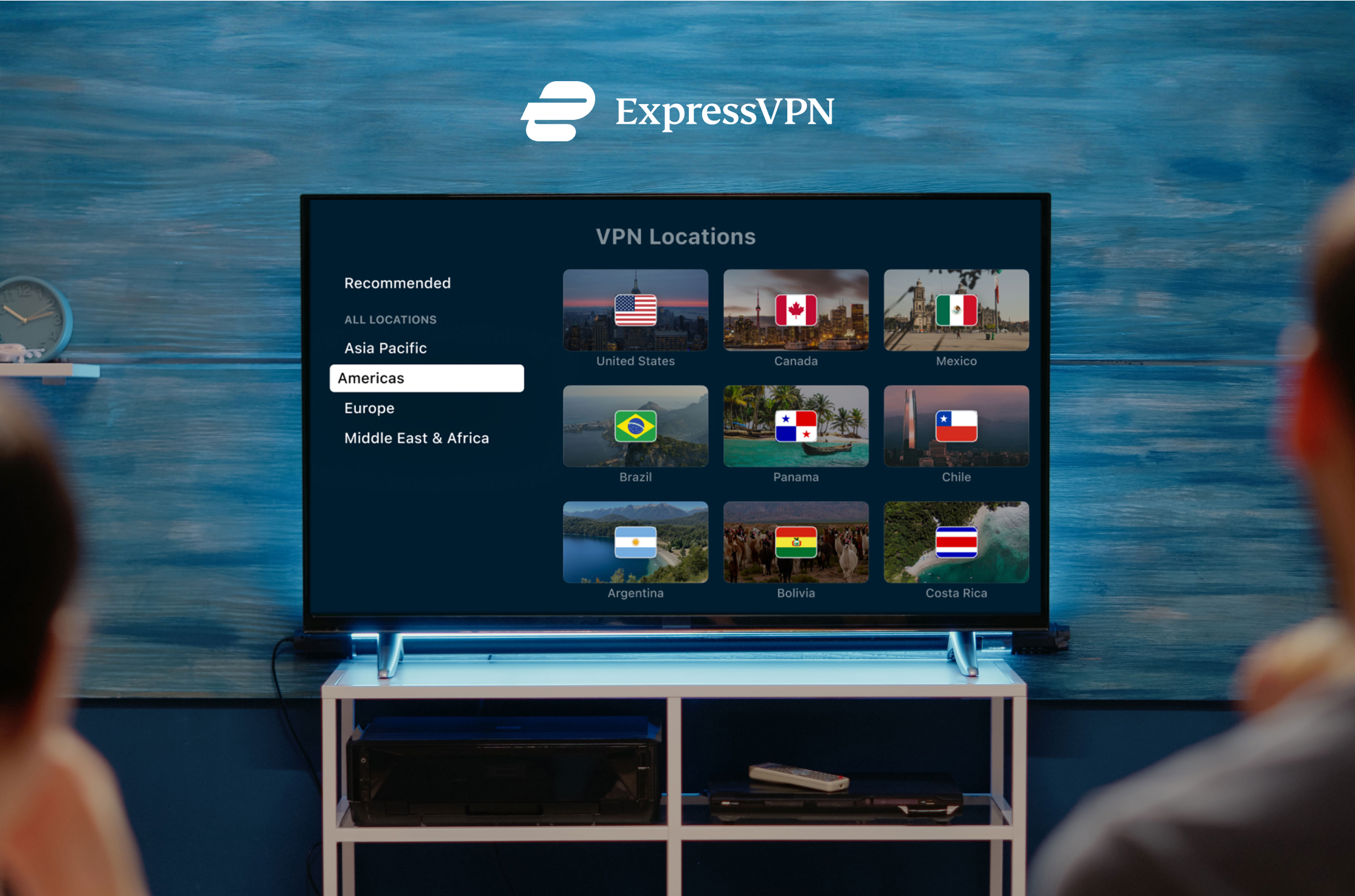
2. ExpressVPN
Easy to use and installs in a flash
Speed: 750 Mbps | Servers: 3,000+ | Locations: 160 | Platforms: Windows, Mac, Linux, iOS, Android | Router support: Yes | Simultaneous connections: 8 | 24/7 customer support: Yes | Streaming services unblocked: Netflix, Amazon Prime Video, Disney Plus, BBC iPlayer, YouTube, Hulu
ExpressVPN delivers a top-tier VPN service and consistently ranks well because of it—and it's no different when it comes to my gaming rankings.
I put ExpressVPN's very own proprietary protocol, Lightway, to the test to see just how speedy it is, and I was pretty impressed. The protocol clocked in at an impressive 750 Mbps. With these speeds, you should experience a butter-smooth online gaming experience.
The ExpressVPN apps look awesome. They're not clinical or overly techy, and don't make you go through any complication configurations during setup. In fact, the one-click connect feature will pair you up with a speedy server in one click (or tap), and then you're ready to go. If you're hoping to pop VPN coverage on your PlayStation 5 or Xbox too, ExpressVPN's dedicated router app makes the process a breeze.
The VPN packs military-grade encryption that'll keep bad actors from getting their paws on your identifiable information, too, and an audited no-logs policy. This is just what I like to see—and confirms that ExpressVPN has no interest in keeping tabs on what you get up to online.
Once playtime is over, you can kick back and enjoy a film or a TV show, because ExpressVPN is an outstanding streaming VPN. With 3,200 servers across 160 locations, you'd be hard-pressed to find geo-blocked content you can't get access to. I was able to unblock tons of Netflix libraries, Prime Video, BBC iPlayer, and smaller regional services without a hitch.
Despite delivering the kind of service that would impress advanced users, its simple UI, attentive customer service team, and streamlined set-up make ExpressVPN great for beginners.
The best cheap gaming VPN
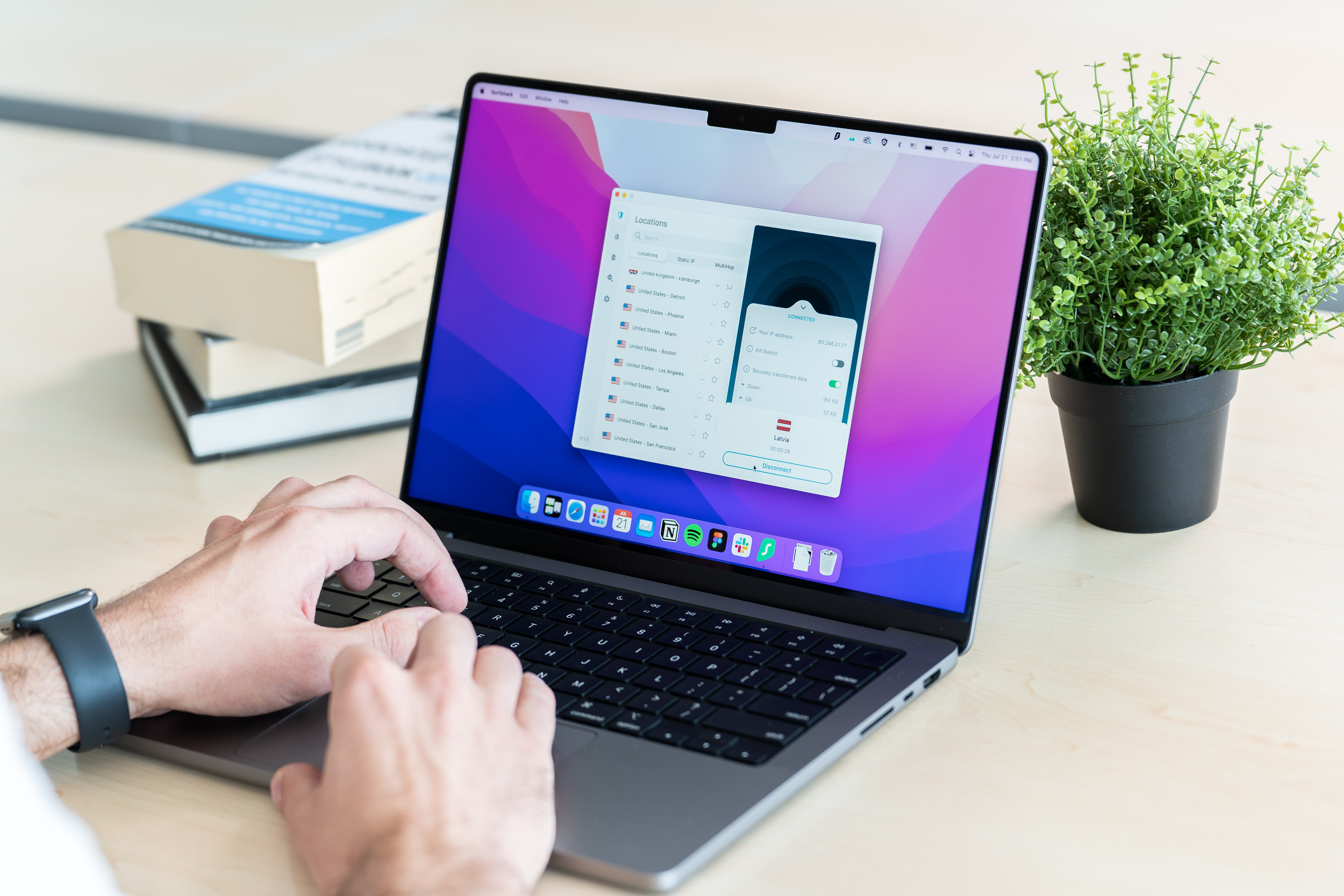
3. Surfshark
Small price tag, massive value
Speed: >950 Mbps | Servers: 3,200+ | Locations: ~100 | Platforms: Windows, Mac, Linux, iOS, Android | Router support: Limited | Simultaneous connections: Unlimited | 24/7 customer support: Yes | Streaming services unblocked: Netflix, Amazon Prime Video, Disney Plus, BBC iPlayer, YouTube, Hulu
Surfshark plans are available for an absolute steal, and you can shore up your digital privacy and take your gaming to the next level for as little as $1.99 a month. Oh, and the provider stuffs a ton of functionality into this itty-bitty pricetag.
Let's start with the unlimited simultaneous connections. One Surfshark plan lets you cover each and every device in your house—and share the love with friends and family if you're feeling generous. So, if your gaming spans muliple systems (or if you live with a few roomates who share your pastime), Surfshark offers the best package in terms of sheer value.
Surfshark doesn't have quite as many servers as the likes of ExpressVPN or NordVPN, but coverage across 100 countries is still pretty impressive.
The provider holds its own when it comes to speedy and security, however, with WireGuard speeds of an awesome 950 Mbps and a full suite of privacy-enhancing tools. Surfshark's battle-tested encryption means you won't have to spend as much time worrying about swatting, doxing, and other IP-based attacks, which is especially important if you're planning on doing any streaming.
Surfshark can really feel like a premium service despite its low cost. The only area where you start to notice some cut corners is in the weakness of its bonus features. For example, the kill switch occasionally falters when put under pressure, and its antivirus and ad blocker underperform somewhat as well. Overall though, Surfshark far exceeds what you'd expect for such a budget-friendly VPN.
The best ad-blocking VPN
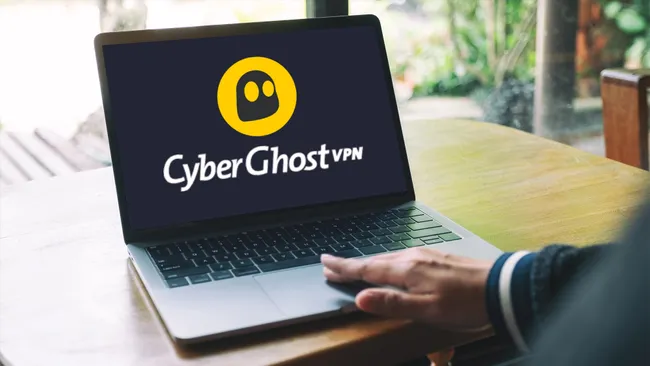
4. CyberGhost
Bustin' cybersecurity threats
Speed: 630 Mbps | Servers: 9,200+ | Locations: ~116 | Platforms: Windoiws, Mac, Linux, iOS, Android | Router support: Limited | Simultaneous connections: 7 | 24/7 customer support: Yes | Streaming services unblocked: Netflix, Amazon Prime Video, Disney Plus, BBC iPlayer, YouTube, Hulu
Don't let its placement in the number four spot fool you—CyberGhost is a staple of the VPN industry that offers a stellar service jam-packed with features.
I particularly like how CyberGhost organizes its server list. The provider makes a real effort to display which servers are optimized for tasks like streaming, torrenting, and gaming (of course). This might seem like a really basic feature to get excited about, but it's the kind of thing that makes CyberGhost a great pick for VPN newbies. After all, who wants to faff around to see which servers are better suited for which activity?
CyberGhost's main issue is that it suffers from an underwhelming support section on its main site. The rather basic offering doesn't hold up when compared to ExpressVPN and NordVPN but, on the bright side, there are friendly, helpful customer support agents available 24/7 to help you out of any binds you find yourself in.
If you're not fully convinced of the benefits of CyberGhost as a gaming VPN, you have plenty of time to test it out. This is thanks to the especially generous money-back guarantee, which gives you 45 days to see how the VPN performs with all your favorite online multiplayer titles.
The best VPN for Linux

5. Private Internet Access
A feature-packed gaming VPN that lives up to its name
Speed: 360 Mbps | Servers: 10,000+ | Locations: ~100 | Platforms: Windows, Mac, Linux, iOS, Android | Router support: Yes | Simultaneous connections: Unlimited | 24/7 customer support: Yes | Streaming services unblocked: Netflix, Amazon Prime Video, Disney Plus, BBC iPlayer, YouTube, Hulu
Beyond providing rock-solid protection from cyber threats and consistent content unblocking, Private Internet Access (PIA) also delivers a service that is well-optimized for Linux users—making it one of only a handful of VPNs to really spoil the Linux community.
In fact, if your PC or laptop is running Linux, PIA has a very useful Linux GUI, rather than a CLI. PIA's dedicated Linux support also makes it a great pick for anyone doing their gaming via Steam Deck.
PIA is all about customization, too, and you'll be able to head into the VPN's settings to tweak your encryption setup right away. This allows for a tailor-made balance between security and speed.
Admittedly, beginners might find the ability to switch up their VPN protocol at will a little intimidating, but PIA comes ready to use out of the box—so, if you want to get straight to the good stuff (and hop into an online game or match) you absolutely can. Advanced users, on the other hand, will undoubtedly value the freedom to beef up security when needed and to pare it back again when they want to boost performance.
The only significant downside of PIA when compared to the other entries on my list is that it's slower on average, providing speeds of around 360 Mbps. This is still more than sufficient to game online without a hitch. However, if you like to livestream while you game, it may be worth choosing a faster VPN.
VPN Speed testing
A sluggish connection is never fun. While high ping can serve as a handy excuse for underperforming in multiplayer games, no one actually wants to deal with the frustration of rubberbanding around the map. Not to mention, if you're using a VPN to bypass throttling from your ISP, it's totally counterintuitive to use one that majorly tanks your internet speed.
Luckily, you don't have to sacrifice speed for security. Some VPN services deliver the best of both worlds and, depending on the tunneling protocol used, they can even perform on par with your unsecured line.
The general rule of thumb is that OpenVPN is the industry's security gold standard. You can obfuscate your VPN traffic when using OpenVPN, too, which comes in handy if you're planning on playing a game banned in your location. WireGuard, on the other hand, is the speedster's choice. Stick with it if performance is your top priority—and make sure it's UDP configured if you can (the lack of authentication gives you an extra boost).
To figure out just how quick today's top VPNs are, I put 25 of the most popular providers to the test on a 1Gbps line. I compared each VPN's speeds using several internet speed measurement tools including Ookla and nPerf. To verify the consistency of each VPN, I made sure to repeat these tests at downtimes, peak times, and intervals in between.
Where applicable, I compared both the VPN's performance on OpenVPN and Wireguard (or a provider-specific equivalent). You can check out the median average of these results below.
VPN Provider | WireGuard or proprietary | OpenVPN |
|---|---|---|
1. Surfshark | over 950 Mbps (maxed out our testing) | 640 Mbps |
2. Mullvad | over 950 Mbps (maxed out our testing) | 410 Mbps |
3. Proton VPN | over 950 Mbps (maxed out our testing) | 400 Mbps |
4. Windscribe | over 950 Mbps (maxed out our testing) | 240 Mbps |
5. PrivadoVPN | over 950 Mbps (maxed out our testing) | 220 Mbps |
6. NordVPN | over 950 Mbps (maxed out our testing) | 110 Mbps |
7. Norton VPN | over 950 Mbps (maxed out our testing) | 240 Mbps |
8. PureVPN | 880 Mbps | 210 Mbps |
9. Atlas VPN | 785 Mbps | N/A |
10. IPVanish | 770 Mbps | 230 Mbps |
11. CyberGhost | 760 Mbps | 360 Mbps |
12. FastestVPN | 730 Mbps | 170 Mbps |
13. AirVPN | 710 Mbps | 300 Mbps |
14. Hide.me | 690 Mbps | 210 Mbps |
15. Hotspot Shield | 600 Mbps | N/A |
16. VyprVPN | 590 Mbps | 145 Mbps |
17. TunnelBear | 480 Mbps | 180 Mbps |
18. ExpressVPN | 410 Mbps | 210 Mbps |
19. StrongVPN | 395 Mbps | 210 Mbps |
20. Astrill VPN | 390 Mbps (unstable speeds) | N/A |
21. Private VPN | 350 Mbps | 125 Mbps |
22. Private Internet Access | 330 Mbps | 270 Mbps |
23. Mozilla VPN | 360 Mbps | N/A |
24. Google One | 345 Mbps | N/A |
25. UltraVPN | 300 Mbps | N/A |
How to pick a gaming VPN
Free VPNs won't deliver the level of security, privacy, and ease of use you’d expect from any of the paid VPN plans. In fact, they can leave you even more vulnerable than you were without a VPN. Unfortunately, my advice would be to steer clear.
While my list of top picks might have narrowed things down, it's still up to you to decide which VPN suits your personal use case the best. The simplest way to arrive at an answer is to consider a couple of key factors, like your budget, the number of devices you're hoping to cover, and what you're going to use your VPN for.
Budget: It always feels good to get a bargain. However, if you're serious about your privacy and can afford it, it's worth forking out a little extra on a more reputable, comprehensive plan like ExpressVPN.
Number of devices: If you want to use a VPN on multiple devices, you'll need to make sure that your chosen provider allows for enough simultaneous connections. Alternatively, you could opt for a VPN with router support, which will enable you to cover as many devices as you'd like within your household.
Use cases: Of course, all of the choices on my list are great for gaming in general but some of them will thrive more than others in particular situations. For example:
Are you looking to connect to a game server in other regions or access geo-blocked content? Make sure to choose a VPN provider with plenty of servers that are well-distributed around the globe.
Want to use a VPN on your games console? Then you'll need to choose a provider with router support, as most consoles don't offer native support for VPN applications.
If you happen to be a bit of a film buff as well as a gamer, you'll want to check that your VPN of choice unlocks your favorite streaming services, too.
How we test VPNs
When it comes to testing, we like to get down to the nitty-gritty. While providers may make claims of greatness as part of their sales pitches, the only way to verify which VPNs are worth investing in is to try them out properly. What's better, we strive to keep our results up-to-date by repeating tests every 6 months.
What does that testing look like for us? To start with, we try to sign up for plans anonymously. After all, we want to replicate the kind of experience you'd have at home as closely as possible. It's no good having providers on their best behavior just because they know they're being tested—we want the real deal.
Here’s what we focus on during our process:
Consistency across operating systems: By installing and testing each provider's apps on Windows, Mac, Linux, iOS, and Android, we can take time to assess each version's reliability, ease of use, and availability of features.
Security: While reliable tunneling protocols, kill switches, and leak protection are reassuring, we like to see them in practice. So, play the hacker and deliberately target our devices to thoroughly stress-test each VPN's line of defense.
Speed: To produce a crystal clear impression of what performance you can expect from your VPN, we ensure we duplicate our speed tests at regular intervals throughout the test session and measure the data with a variety of tools.
Unblocking capabilities: We verify VPN providers' content unblocking promises by attempting to access geo-locked content on streaming services like Netflix, Disney Plus, Amazon Prime Video, or entirely region-locked services like BBC iPlayer and HBO Max.
Privacy: We commit to a deep dive into each provider's privacy policy and investigate the outcome of any third-party audits the company has undergone.
FAQs
Which is the best VPN for gaming?
NordVPN is currently the best gaming VPN on the market. It has majorly impressed me by delivering a stellar combination of speed, server distribution, and ease of use.
Should I use a free VPN?
Using a free VPN is not recommended. If you decide to use a free VPN, you'll have to make some pretty significant compromises. For the most part, limited functionality, weakened security/privacy protections, and irritating ads undermine the benefits of not having to pay.
If you're short on funds but are still looking for a great VPN for gaming, I'd recommend trying out a low-cost VPN like Surfshark or starting a free trial of one of the reputable VPN providers listed above.
Can using a VPN for gaming reduce ping?
The encryption processes of a VPN tend to reduce your connection speed somewhat. Thankfully, this doesn't always translate into a laggier gaming experience. In fact, using a VPN can reduce ping in some circumstances.
For example, a VPN will do wonders to improve latency if you've been subjected to throttling from your internet service provider. Using a VPN obscures your activity from your ISP, which will majorly reduce the likelihood of having your connection throttled. As a result, you'll see more consistent performance.
Is it legal to use a VPN for gaming?
The act of using a VPN is perfectly legal in the vast majority of countries. So, you're in the clear to use a VPN provided you're not planning a trip to North Korea, Iraq, Belarus, Oman, or Turkmenistan anytime soon.
That said, the anonymity afforded by using a VPN does mean they sometimes get associated with shady online activities. Once you stay on the right side of the law, you have nothing to worry about.
Can I get banned for using a VPN?
With all the benefits of using a gaming VPN and their unfortunate association with hackers, some games' terms of service prohibit the use of a VPN.
However, even in these cases, it's rare to face any penalty as your VPN prevents your IP from appearing on connection logs. This VPN IP cloaking is also helpful for situations where you feel you've been unjustly IP-banned.
Which VPN protocol is best for gaming?
The choice is yours, really, but if speed is your main concern you should stick with WireGuard. WireGuard is the industry's go-to pick for performance, seeing as it's composed of a measly 5,000 lines of code, and the protocol I use when I'm putting VPNs to the test.
On the other hand, if you'd rather focus on privacy, OpenVPN is your best pick. OpenVPN is open-source, meaning anyone can check the code for vulnerabilities, and is hugely customizable. Although it's not as fast or lightweight as WireGuard (being composed of 70,000 lines of code), it offers obfuscation tools that'll mask your VPN usage and help you get around those pesky VPN bans and instances of censorship.
Keep up to date with the most important stories and the best deals, as picked by the PC Gamer team.
- Dave JamesEditor-in-Chief, Hardware
